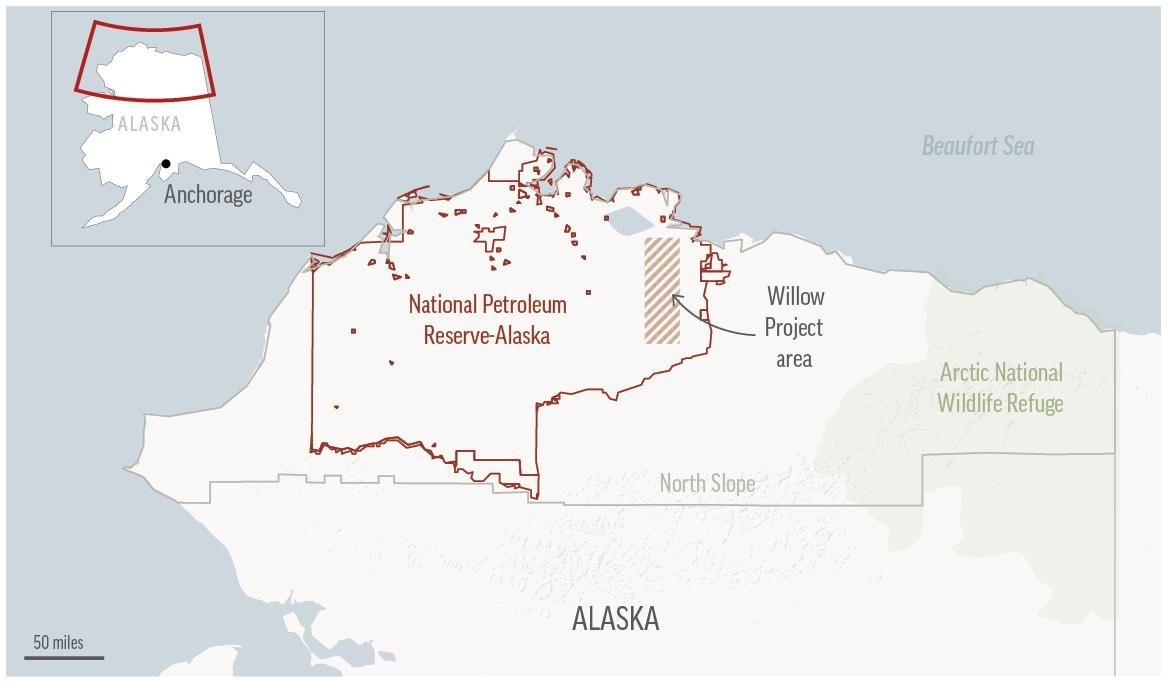Controversy Surrounding the Willow Project
Students and community members demand President Biden stop the Willow Project. Source: Forbes
On March 13, the Biden Administration approved the ConocoPhillips Willow Project, a move some organizations are calling a “carbon bomb,” allowing thirty years of oil and gas extraction in Willow, Alaska. But what does the Willow Project involve, and why is it so controversial?
What is the Willow Project?
Covering 94,796 miles² and bordering Beaufort Sea (part of the Arctic Ocean), the North Slope in Alaska has produced over 18 billion barrels of oil, and has been a major source of economic growth in Alaska. The National Petroleum Reserve in Alaska (NPR-A), located in North Slope, is owned by the federal government and covers over 35,908 miles².
Following major oil discoveries in Willow (an area of the NPR-A) in 2016 and 2018, the Willow Project was proposed by the largest oil producer in Alaska: ConocoPhillips. Five drilling sites were initially proposed, with the US Record of Decision accepting three of those sites, totalling almost 200 wells. The Willow Project is the largest oil and gas project in the USA currently, and is estimated to cost $8 billion. In 2021, ConocoPhillips produced approximately 200,000 barrels of oil every day in 2021. In comparison, it is estimated that the Willow Project alone will produce 180,000 barrels of oil every day.
Map of the Willow Project in North Slope, Alaska. Source: AP News
A Controversial Decision
Several benefits cited for the Willow Project include improving employment opportunities in Alaska, with approximately 2,500 jobs created during a cost of living crisis. Furthermore, it is estimated that the Willow Project will provide $8.7 billion to the US economy, including through royalties and tax revenues. Supporters also argue that the project will support the economy of Indigenous communities, improving investment in local infrastructure and provision of public services.
In contrast, there are significant environmental concerns that the Willow Project presents. Climate change was one of the main priorities during the 2020 US presidential election. In 2021, President Biden announced a national target of reducing greenhouse gas emissions by 50-52% by 2030 (in comparison to 2005’s levels). During his presidential campaign, President Biden promised “no more drilling on federal lands, period.” However, within his administration’s first two years, President Biden has granted more drilling leases than Trump had. Many believe that the Willow Project is disastrous for combating the climate crisis, with over one million letters written to the White House and over three million signatures on online petitions in protest.
While the US Department of the Interior explained that the number of drilling sites agreed on are 40% less than the initial proposal, there is concern that despite this decrease, ConocoPhillips will still produce 92% of the oil that they initially expected to. This is equivalent to having an additional 56 million cars on the roads over the 30-year project. Furthermore, many argue that the restrictions proposed on March 12 to reduce future oil and gas leasing in the NPR-A and designating US Arctic Ocean as off-limits for oil and gas leasing is an attempt to pacify those concerned about the environmental impacts of the Willow Project.
The Republicans have previously blamed the Biden administration for rising gasoline prices, and emphasized the importance of energy independence. Therefore, the Biden administration has needed to balance politics, equity and justice, energy security, and climate action. However, it appears that the latter is suffering the consequences. Earth Justice, a non-profit environmental law organization, is an example of those willing to take legal action against the Willow Project to ensure that climate action is not compromised.
Human activity, including burning fuels, is the leading cause of climate change. Despite the emphasis to phase out fossil fuels, the fossil fuel industry has reported record profits due to rising energy prices. The Willow Project is likely to perpetuate our reliance on fossil fuels.


